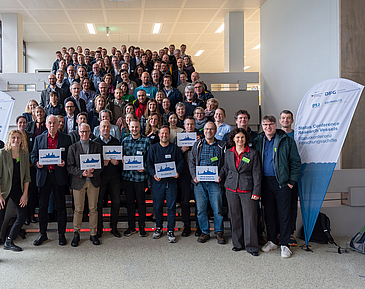The ships of the German research fleet – ALKOR, ELISABETH MANN BORGESE, HEINCKE, METEOR, MARIA S. MERIAN, POLARSTERN, and SONNE – are crucial floating platforms for national and international marine sciences. They enable researchers to collect current data directly from the ocean floor. This data is essential for understanding global phenomena such as climate change, changes in marine biodiversity, and ecosystems, as well as geological hazards and events under the ocean floor.
At the Status Conference Research Vessels, scientists will share results from 108 such research expeditions from 2019, 2020, and 2021 in 80 presentations. There will be talks and discussions on marine chemistry, marine biology, marine geology, oceanography, marine engineering, marine geophysics, marine geochemistry, and marine biogeochemistry. One of the unique features of the conference is that it brings together leading researchers, evaluators, shipping representatives, investors, and science managers from the field of marine sciences.
Research Minister Stark-Watzinger: “State-of-the-Art Research Fleet Is Indispensable”
The organizers are the Review Panel German Research Vessels (GPF) and Project Management Jülich on behalf of the Federal Ministry of Education and Research. The University of Bremen is hosting the event. Federal Minister of Education and Research Bettina Stark-Watzinger emphasizes the crucial role of research vessels: “If we want to combat climate change effectively, we need to understand the oceans even better. A state-of-the-art research fleet such as ours, which is active worldwide in the service of science, is indispensable for this. Interdisciplinary scientific exchange, as is now the case at the Status Conference Research Vessels, is also of great importance. Because in order to develop prospects for the future of the oceans and polar regions, we need data, digital models, and scientific innovation. We therefore want to provide support for dialogue and networking as well as promote the renewal of research infrastructure. Investments in new high-tech ships such as the currently emerging METEOR or, in the future, the successor ship to the POLARSTERN are particularly important.”
“Research institutes such as MARUM in Bremen and the Alfred Wegener Institute in Bremerhaven deal with important marine issues,” emphasizes Senator for the Environment, Climate, and Science Kathrin Moosdorf. “In order to find answers, researchers need ships, diving robots, measuring instruments, and much more. The Research Vessel Status Conference, which started today at the University of Bremen, gives a very good impression of this. Maintaining, renewing, and further developing this infrastructure is very important so that marine research continues to be able to gain new insights in the future. We also need these results to understand and counteract climate change, for example, and to better protect marine life. I am delighted that we are hosting the conference in Bremen,” she states.
Professor Jutta Günther, President of the University of Bremen, underscores the role of Bremen State and the university: “Bremen as a scientific research location is known for its internationally outstanding work in marine research. The university is at the center of this research network and acts on an equal footing with the non-university research institutions in the country. The knowledge that emerges here forms important foundations for the protection of our oceans, the climate, and the environment.”
The status conference in English is an integral part of the process for allocating ship time on the German research vessels. In addition to the reports and results from research and poster presentations, this conference will also focus on the construction of the research vessel METEOR IV and the multi-month FUTURO expedition. Due to the pandemic, it is the first status conference to take place in person.
At the University of Bremen, the research institute MARUM – Center for Marine Environmental Sciences conducts ship expeditions to many areas of the world’s oceans in order to understand the relationships between ocean and climate, interactions between geosphere and biosphere, and the dynamics of the seabed. The Cluster of Excellence “The Ocean Floor – Earth’s Uncharted Interface,” which is located at MARUM, is one of 57 research networks funded nationwide by the German Research Foundation (DFG) since 2018. With an application for continuation of the cluster and a new application of the draft proposal “The Martian Mindset: A Scarcity-Driven Engineering Paradigm,” the University of Bremen is applying in a new round of the Excellence Strategy of the German federal and state governments in the Cluster of Excellence funding line.
Further Information:
About the conference including agenda: https://event.ptj.de/statuskonferenz-forschungsschiffe-2024
For the conference transcript: https://event.ptj.de/statuskonferenz-forschungsschiffe-2024#tagungsband
Contact:
Prof. Gerhard Bohrmann
University of Bremen
Faculty of Geosciences
MARUM – Center for Marine Environmental Sciences
Phone: +49 421 218-65050
Email: gbohrmannprotect me ?!marumprotect me ?!.de
Press contact during the status conference:
Henning Kraudzun
Project Management Jülich
Marine and Maritime Research, Geosciences and Shipping (mgs)
Phone: +49 381 20356-277
Email: h.kraudzunprotect me ?!fz-juelichprotect me ?!.de

